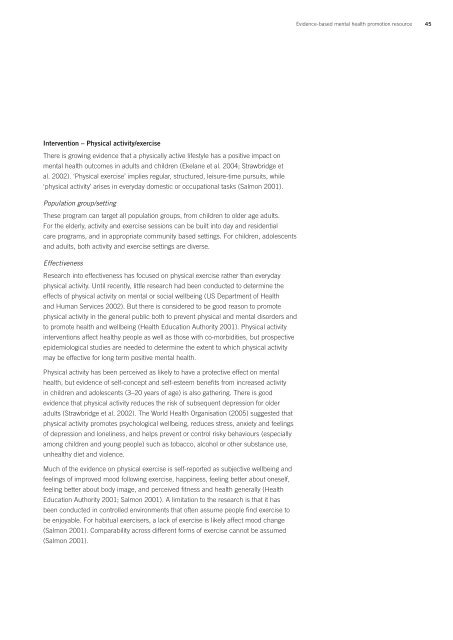Evidence-based mental health promotion resource - health.vic.gov.au
Evidence-based mental health promotion resource - health.vic.gov.au
Evidence-based mental health promotion resource - health.vic.gov.au
You also want an ePaper? Increase the reach of your titles
YUMPU automatically turns print PDFs into web optimized ePapers that Google loves.
<strong>Evidence</strong>-<strong>based</strong> <strong>mental</strong> <strong>health</strong> <strong>promotion</strong> <strong>resource</strong>45Intervention – Physical activity/exerciseThere is growing evidence that a physically active lifestyle has a positive impact on<strong>mental</strong> <strong>health</strong> outcomes in adults and children (Ekelane et al. 2004; Strawbridge etal. 2002). ‘Physical exercise’ implies regular, structured, leisure-time pursuits, while‘physical activity’ arises in everyday domestic or occupational tasks (Salmon 2001).Population group/settingThese program can target all population groups, from children to older age adults.For the elderly, activity and exercise sessions can be built into day and residentialcare programs, and in appropriate community <strong>based</strong> settings. For children, adolescentsand adults, both activity and exercise settings are diverse.EffectivenessResearch into effectiveness has focused on physical exercise rather than everydayphysical activity. Until recently, little research had been conducted to determine theeffects of physical activity on <strong>mental</strong> or social wellbeing (US Department of Healthand Human Ser<strong>vic</strong>es 2002). But there is considered to be good reason to promotephysical activity in the general public both to prevent physical and <strong>mental</strong> disorders andto promote <strong>health</strong> and wellbeing (Health Education Authority 2001). Physical activityinterventions affect <strong>health</strong>y people as well as those with co-morbidities, but prospectiveepidemiological studies are needed to determine the extent to which physical activitymay be effective for long term positive <strong>mental</strong> <strong>health</strong>.Physical activity has been perceived as likely to have a protective effect on <strong>mental</strong><strong>health</strong>, but evidence of self-concept and self-esteem benefits from increased activityin children and adolescents (3–20 years of age) is also gathering. There is goodevidence that physical activity reduces the risk of subsequent depression for olderadults (Strawbridge et al. 2002). The World Health Organisation (2005) suggested thatphysical activity promotes psychological wellbeing, reduces stress, anxiety and feelingsof depression and loneliness, and helps prevent or control risky behaviours (especiallyamong children and young people) such as tobacco, alcohol or other substance use,un<strong>health</strong>y diet and violence.Much of the evidence on physical exercise is self-reported as subjective wellbeing andfeelings of improved mood following exercise, happiness, feeling better about oneself,feeling better about body image, and perceived fitness and <strong>health</strong> generally (HealthEducation Authority 2001; Salmon 2001). A limitation to the research is that it hasbeen conducted in controlled environments that often assume people find exercise tobe enjoyable. For habitual exercisers, a lack of exercise is likely affect mood change(Salmon 2001). Comparability across different forms of exercise cannot be assumed(Salmon 2001).



